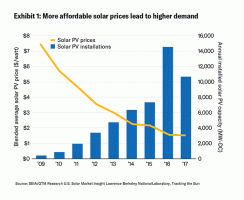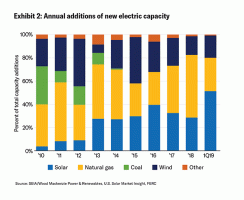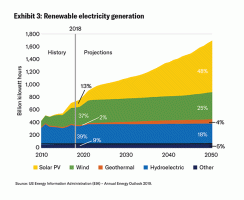Growth in the renewable energy sector has given rise to a new form of securitized investment opportunity – solar asset-backed securities (ABS). This innovative investment packages consumer receivables originated by solar energy companies, and offers fixed income investors an opportunity to invest in the growing renewable energy movement. Demand for solar renewable energy financing has been fueled by an increasing use of solar power driven by decreasing installation costs, and recent initiatives and regulations mandating the use of solar panels. With high levels of collateralization and credit enhancement, as well as relatively low default risk, solar ABS provides a potentially attractive opportunity to invest alongside long-term sustainability megatrends.
What is solar ABS?
Solar asset-backed securities (ABS) are securities collateralized, or backed, by consumer receivables originated by solar energy companies. Each solar securitization is comprised of loans, leases, or power purchase agreements (PPAs) used to finance photovoltaic (PV) systems. Solar loans allow consumers to finance the purchase of a PV system from a solar installer, while solar leases and PPAs involve renting the equipment from a solar company. Under a PPA, the consumer purchases system-generated electricity at an agreed-upon rate subject to annual increases. With a solar lease, payments are typically fixed. The periodic payments from these consumers for their PV systems are the cash flows used to repay solar ABS. While still an emerging sector, solar ABS issuance grew to over $2 billion in 2018, with seven active issuers.
Costs of solar power decline as industry grows
The cost to install solar power has dropped by more than 70% over the last decade. This has enabled the industry to expand into new markets and deploy thousands of solar systems across the U.S. As shown in Exhibit 1, solar installation prices are at all-time lows. Today the average-sized residential system costs $18,000, down from $40,000 in 2010.1

Additionally, as the cost of harnessing solar power has declined and become more competitive with other forms of electricity, its share of new electricity capacity has increased (Exhibit 2).

Affordable energy alternative
The pursuit of energy efficiency has led homeowners to upgrade appliances, replace doors and windows, and change out light bulbs for more energy-efficient counterparts. Similarly, solar PV systems can offer consumers an energy-efficient alternative to traditional electricity. Initial implementation and affordability have become less of a barrier due to tax incentive programs which encourage consumers to make the switch. Additionally, the growing awareness and affordability of solar power has allowed solar ABS issuers to reassign solar contracts upon a house sale to the new owners, with little to no loss of expected cash flow.
Potentially attractive investment opportunities
Solar ABS can offer an attractive risk/reward profile for fixed income investors. The securities are typically well-structured, with high levels of collateralization and credit enhancement, relatively low risk of default, and an attractive spread. Solar ABS are collateralized by the underlying PV systems, with credit enhancement consisting of (i) overcollateralization, (ii) subordinate bonds, (iii) general reserve account, (iv) inverter replacement reserve account, and (v) excess spread. Additionally, to date, all solar ABS transactions have been comprised of pools of consumers with weighted-average FICO scores above 700. Moreover, at Aegon Asset Management US, we believe that because solar lease or loan payments often displace a consumer’s former energy payment, losses in this sector will remain low. Defaulting on a solar loan is unlikely to reduce a consumer’s overall payment obligation – they need to purchase energy in some form, and defaulting on a solar loan could revert them to paying higher monthly energy expenses. While this asset class has not been through a full credit cycle (the first solar ABS was issued in 2013), we believe a combination of a higher credit quality consumer and the desire for a budget-saving power source may reduce the risk of default/loss on the underlying loan/lease payment.
A sustainable ecological solution
With a focus on combatting climate change, consumers and utilities are continuing to shift away from traditional fossil fuels and pivot toward renewable energy sources such as solar, wind, and geothermal. Unlike coal, petroleum, and other fossil fuels, solar power contributes to a more sustainable environment as a clean, carbon-free form of green energy. Solar ABS directly supports a sustainable future by offering solar energy providers a term funding source. Solar loan/lease payments primarily displace the homeowner’s former energy bill, with the average system generally sized to provide more than 90% of the home’s current usage.
Looking forward as a growing sector evolves
As an emerging industry, the legislative landscape surrounding the solar industry is constantly changing. For instance, laws affecting net metering – the method of measuring the amount of energy generated by consumer solar energy systems that is added back to the grid – and the price at which this solar energy is sold back have varied; tax credit legislation, including tax credits given for the purchase of residential PV systems, start declining in 2020 and end after 2021; and, the solar import tariffs enacted by President Trump in 2018 have all affected the solar industry, as well.
Although the opportunities related to solar are bright, there are potential risks2 that should be considered. While solar technology is not new, there is risk that over time the customer will no longer achieve the expected economic savings if, for example, local energy rates were to transition to a discount versus the cost of the solar loan/lease. Similarly, supply could be at risk if solar power generation is lower than expected due to degradation of PV system performance or lack of equipment maintenance.
Looking ahead, recent initiatives and regulations mandating the use of solar panels are expected to continue to boost the demand for solar power. For example, California legislation mandating all new homes be built with solar panels will contribute to the surge in solar adoption. More broadly, the secular sustainability shift supports the case for solar. Although some may debate the cause of global warming, there is a clearly increased effort globally to combat climate change. Utilities are investing in wind and solar power, and deemphasizing use of fossil fuels. As outlined in the U.S. Energy Information Administration’s annual report for 2019, electricity generation from renewables, particular solar energy, is expected to continue to increase (Exhibit 3).

Conclusion
As legislation, technology, and equipment within this sector continue to develop, we believe the potential challenges must be monitored closely to evaluate the effect on investment opportunities. However, as with any new asset class, the evolution of the origination process, the bond structure, and the adaptation of technology are likely to make solar ABS an interesting sector for growth and sustainable investment opportunities.
Learn more about our approach to responsible investing.
Access all literature related to responsible investing.
1 SEIA Solar Industry Research Data
2 Please see disclosures for additional information on general risks associated with asset-backed securities.
Disclosure
Past performance is not indicative of future results. The information contained in this article is for informational purposes only and should not be considered investment advice or a recommendation of any particular security, sector, strategy or investment product. The article contains the current opinions of the author and is accurate as of the date of the article. Such opinions are subject to change without notice. The author is under no obligation, expressed or implied, to update the material contained herein.
All investments contain risk and may lose value. Socially responsible investing is qualitative and subjective by nature, and there is no guarantee that the criteria utilized, or judgment exercised by any company of Aegon Asset Management will reflect the beliefs or values of any one particular investor. There is no guarantee that socially responsible investing (SRI) products or strategies will produce returns similar to traditional investments.
Results for certain charts and graphs are included for illustrative purposes only and should not be relied upon to assist or inform the making of any investment decisions.
Specific sectors mentioned do not represent all sectors in which Aegon AM US seeks investments. It should not be assumed that investments of securities in these sectors were or will be profitable.
Structured Finance assets (such as ABS, RMBS, CMBS and CLOs) are complex instruments and may not be suitable for all investors. The assets may be exposed to risks such as interest rate, credit, liquidity, issuer, servicer, underlying collateral, prepayment, extension and default risk. Investors typically receive both interest and principal payments for a security and these prepayments may reduce the interest received and shorten the life of the security. Although some types of structured finance securities may be generally supported by a form of government or private guarantee, there is no assurance that guarantors will meet their obligations.
This article contains forward-looking statements which are based on the firm's beliefs, as well as on a number of assumptions concerning future events, based on information currently available, and are subject to change without notice. These statements involve certain risks, uncertainties and assumptions which are difficult to predict. Consequently, such statements cannot be guarantees of future performance and actual outcomes and returns may differ materially from statements set forth herein.
Aegon Asset Management US is a US-based SEC registered investment adviser and is also registered as a Commodity Trading Advisor (CTA) with the Commodity Futures Trading Commission (CFTC) and is a member of the National Futures Association (NFA). Aegon Asset Management US is part of Aegon Asset Management, the global investment management brand of the Aegon Group.






